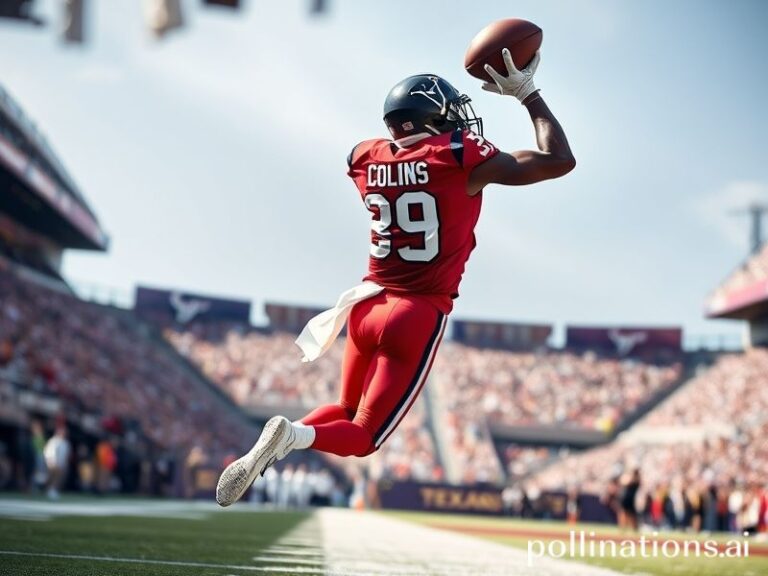Mikey Lewis: The Hull Wonder Kid Who Became a Global Rorschach Test
Mikey Lewis: The Miniature Messiah of Hull Who Accidentally Became a Global Emblem of Late-Stage Capitalism
By the time the sun rose over the Mariana Trench, Mikey Lewis—Hull FC’s 22-year-old stand-off with the cheekbones of a Renaissance cherub and the acceleration of a Tokyo bullet train—had already been meme-ified on three continents. In Manila, jeepney drivers looped his 80-metre intercept try against St Helens between rice-sack deliveries; in Lagos, start-ups used his sidestep as a metaphor for “agile disruption”; and somewhere in Silicon Valley a bored billionaire reportedly asked if Lewis could be tokenised into an NFT that screams “northern grit” every time it appreciates.
Welcome to 2024, where a lad from east Yorkshire with a mouthful of metal and a haircut that looks suspiciously like it was done in the dark becomes a geopolitical Rorschach test.
To the International Olympic Committee—still licking self-inflicted wounds after Paris 2024’s break-dancing debacle—Lewis is the poster boy for rugby league’s stealth campaign to crash the 2032 Brisbane party. Their pitch video splices Lewis’s try-line wizardry with drone shots of favelas, Mongolian yurts, and Finnish saunas, all united by the gospel of thirteen-a-side. The subtext: if a game once synonymous with northern English pit villages can conquer TikTok, surely it deserves another shot at the five-ring circus. Never mind that half the planet still thinks “rugby league” is a mispronounced cryptocurrency.
Meanwhile, the People’s Daily ran a 1,200-word editorial praising Lewis’s “collectivist running angles,” which, translated from party-speak, means “look how much better he is than selfish NBA superstars.” Beijing hopes to domesticate the sport the way it once did table tennis—first admire, then appropriate, then win everything. Expect cloned Mikeys dribbling out of an Inner Mongolian academy by 2028, each one force-fed baijiu and socialist slogans between sprint drills.
But the sharpest commentary comes from the streets of Buenos Aires, where inflation now moves faster than Lewis himself. In the San Telmo market, hawkers flog bootleg Hull FC shirts for two pesos and a conspiratorial wink. “He represents the last honest thing left,” one vendor told me, clutching a plastic bag of onions like it was contraband uranium. In Argentina, even hope is contraband.
Closer to home, the British government—fresh from rebranding itself as “Global Brexit” or whatever focus-group fever dream they’re on this week—has drafted Lewis into a soft-power initiative. Picture him teaching tackling technique to Ukrainian refugees in Warsaw, or posing for awkward photos with the King, who visibly flinches whenever he hears the word “scrum.” The irony, of course, is that Lewis’s own hometown voted 70 % Leave, convinced that Brussels bureaucrats were personally stealing their fish. Now he’s the diplomatic equivalent of cod liver oil: hard to swallow, but allegedly good for you.
Yet what makes Lewis genuinely fascinating isn’t the geopolitical theatre; it’s the accidental poetry of his contradictions. He earns less in a season than a Premier League reserve spends on hair transplants, yet he’s more recognisable in Nuku’alofa than any Manchester United bench-warmer. He drives a second-hand Corsa and still lives with his mum, which makes him simultaneously relatable to 99 % of humanity and utterly baffling to the 1 % who think “hardship” means the private jet Wi-Fi is patchy.
And therein lies the global significance. In an era when billionaires race to Mars to escape the mess they made on Earth, Mikey Lewis is what the planet actually needs: proof that raw, unpolished excellence can still detonate joy across borders without an IPO, an app, or a TED Talk. He’s the last USB stick of authenticity in a world running on cloud-based delusion.
So, as COP29 delegates argue over carbon credits in a desert built on slave labour, and AI chatbots begin ghost-writing their own acceptance speeches, remember the kid with the wonky grin who sidestepped an entire civilisation’s mid-life crisis for eighty electrifying metres.
There may still be hope—though, like everything else these days, it’s probably made in Hull and sold on the black market.







